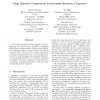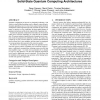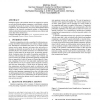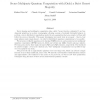DSN
2004
IEEE
15 years 6 months ago
2004
IEEE
In ensemble (or bulk) quantum computation, all computations are performed on an ensemble of computers rather than on a single computer. Measurements of qubits in an individual com...
125
Voted
STOC
1993
ACM
15 years 6 months ago
1993
ACM
In this paper we study quantum computation from a complexity theoretic viewpoint. Our first result is the existence of an efficient universal quantum Turing machine in Deutsch’s...
120
click to vote
STOC
1997
ACM
15 years 6 months ago
1997
ACM
Shor has showed how to perform fault tolerant quantum computation when the probability for an error in a qubit or a gate, η, decays with the size of the computation polylogarithmi...
126
click to vote
FOCS
2002
IEEE
15 years 7 months ago
2002
IEEE
We present the first explicit connection between quantum computation and lattice problems. Namely, our main result is a solution to the Unique Shortest Vector Problem (SVP) under ...
119
Voted
CSL
2003
Springer
15 years 7 months ago
2003
Springer
Quantum computation deals with projective measurements and unitary transformations in finite dimensional Hilbert spaces. The paper presents a propositional logic designed to descr...
140
click to vote
SPAA
2003
ACM
15 years 7 months ago
2003
ACM
Quantum computation has become an intriguing technology with which to attack difficult problems and to enhance system security. Quantum algorithms, however, have been analyzed un...
117
click to vote
ATAL
2005
Springer
15 years 8 months ago
2005
Springer
Intelligent agents in the quantum internet are supposed to operate on networked hybrid quantum computers to individually or jointly accomplish their goals by means of both classic...
118
click to vote
FOCS
2006
IEEE
15 years 8 months ago
2006
IEEE
Secret sharing and multiparty computation (also called “secure function evaluation”) are fundamental primitives in modern cryptography, allowing a group of mutually distrustfu...
154
click to vote
UC
2009
Springer
15 years 9 months ago
2009
Springer
We present a logical approach to the separability analysis issue for a functional quantum computation language. This logic is inspired by previous works on logical analysis of alia...




